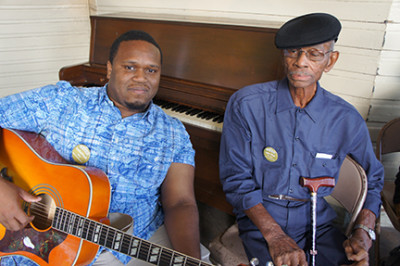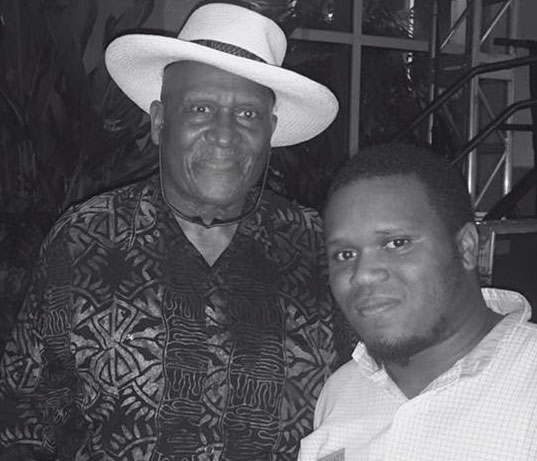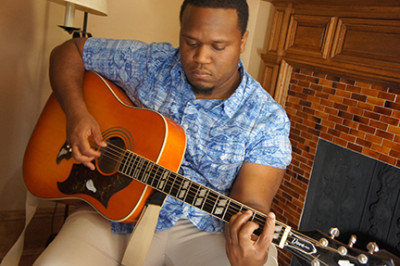by Frank Matheis, as published in Living Blues magazine, April 2016; issue Nr. 242/Vol. 47/#2

Longtime Living Blues editor Jim O’Neil once said that Living Blues wanted “…to show that blues was still a living tradition in the African- American community, to give credit to the blues artists …and to give a voice to the blues artists to tell their own stories. We would hear people say that the blues was dead and we didn’t think that was the case. It’s still the same way today.”
Despite the risible death proclamations made over the years, the blues are still alive and well. Each generation brought along youngbloods who didn’t get the memo about the demise of this particular musical genre. The last time we heard the old blues Taj Mahal, himself of the 1960 s & 70s Class of blues preservationists, proclaim, “ The boy sure has some fire in him and sure can play the blues” he was talking about Corey Harris. That genial bard was, along with Guy Davis, Keb’ Mo’ and Alvin Youngblood Hart, part of the 1990s class of true blues musicians who defied those who tried to lock the old blues in some museum vault. Harmonica ace Phil Wiggins, from the 1970s class of blues survivors as part of the Piedmont duo Cephas & Wiggins, simply laughs off people who made such death pronouncements with, “I think they need to get out more.” Fact is, the blues was there before those fine folks “discovered” it and will be there long after. Even lately, brilliant young players like Jerron Paxton and Dom Flemons have aptly proven that point.
Meet Jontavious Willis, the living proof in the current class of blues-death deniers. Only a few like him emerge every decade or so, when even the most hard core blues fans realize immediately that this is the real deal, a player and singer whose got it all: Deep roots feeling, instrumental prowess and a voice that carries the heart and soul of the blues with unwavering connection to the ancient roots. Not long ago people said that of Jerron Paxton, and now Jontavious Willis deserves to be celebrated as one of the brilliant new voices.
His mentor and protagonist, Taj Mahal, advocated to Living Blues, “Jontavious Willis. That’s my Wonderboy, the Wunderkind. He’s a great new voice of the 21st Century in the acoustic blues. I just love the way he plays. He has really just delightful timing and a real voice for the music because he was raised in the tradition and the culture. It’s just wonderful to hear him sing. The way he tunes his guitar is just amazing. There’s not a bluesman alive that could pick his instrument up and play it. You’d have to sit there for a good while to figure those tunings out. I had an opportunity to have him grace my stage when I came to Atlanta. He had a thunderous response from the audience. It was just so great. I’m very, very particular and very private about my stage so – and if somebody is on it giving the full run to go, you know that they must be able do whatever it is that they say they can do, and I say that he can do it and more. So I’m just excited that he has a wonderful and amazing future and he’s got a great sound, and we are all lucky to be at this point when this man is starting to launch is going to be an incredible and long career.”

The immensely talented Jontavious Willis, from Greenville, Georgia, is an autodidactic multi-instrumentalist, just 19 years old at the time of this writing and a sophomore at Columbus State University, majoring in sociology and anthropology. The emerging young bard plays harmonica, 5-string banjo, and guitar. As his main influences he cites Muddy Waters for guitar, Sonny Boy Williamson on harmonica and Papa Charlie Jackson on banjo. His big breakthrough came in August of 2015 when Taj Mahal asked him to come on stage to play. Taj has been an advocate for young blues payers in the past, notably Corey Harris. That recognition has bolstered Willis, gave him confidence and needed validation. He said, “Taj and I contact each other often, every time we speak he gives me advice. He has done things and is still doing things to help me. Taj in a good man.”
The versatile young bluesman plays all types of country blues: Delta, Piedmont, Texas, Gospel blues and he is equally adept as a fingerpicker, flat-picker and slide player. Taj Mahal cited the unique tunings that Willis uses, and the young bard demonstrated a series of these tunings through the telephone line, and indeed, they sound obscure and unusual, unlike anything this writer could identify.
Willis said, “I like to play old blues because it is a glimpse into the past. A lot of the old bluesmen are forgotten, just a memory and a few records. The blues is the roots of American music and it’s great to explore the roots.” When we asked how he personally connects as a young black man in the 21st century with the music of his great-great grandfather’s time, he stated, “In some aspects the same problems of those day are still occurring. Out of all the current music I connect with the blues the best. The same blues songs of the Jim Crow era can still be sung today. The songs about getting mistreated and abused are still fights we battle daily. But I feel good when I play my blues. I try to give a message rather than a song full of riffs with few words.”

In his childhood Willis was exposed to gospel music in the Mount Pilgrim Baptist Church in Greenville, where he sang since age three and where his grandpa is a singer, something that Jontavious now attributes as a major influence. He said, “That music we sing in the church and the blues are so similar, it’s just different words, but it’s from the same place.” When asked how his pastor and fellow parishioners accept his blues, which in the past has often been chastised and often forbidden as “the devil’s music,” he aptly replied, “I’m still in the same church. They embrace my playing the blues. They are glad to see me studying the old music that they grew up on. The devil music thing, I believe, is overcast by current music. Current music makes Blues seem holy.”
His father, Larry Willis, who works as a technician, had a strong influence on young Willis, who is rooted in family, church and school, and who pledged to finish his college studies before going into music full time. “No matter what, I am going to finish my college. I am going to get my degree. Nowadays, even if I am on the road playing at a festival or whatever, I can do my schoolwork on my laptop. I am committed to that.” His family played all kinds of music in the house and he grew up listening to gospel, soul, blues, more. He started playing guitar at age 14, just five years ago, and taught himself, gravitating toward the old country blues. Interestingly, he read about the controversy after the release of the movie Cadillac Records, when Etta James bitterly complained that Beyoncé sang her old hit At Last. “I didn’t see the movie, but I started to look into it and read up on it. In the course of that, I found Muddy Waters and especially the song Hoochie Coochie man. That hit me. I connected with that. I want to tell a story with my music, so I go more for the old time music from the 1920s to the 1960s, more so than the Chicago blues. I gravitated to Peg Leg Powell, Smokey Hogg, Charley Patton, Son House, Robert Johnson, Buddy Moss, Josh White, and Barbecue Bob. That’s what I like to play. I have a giant playlist and really every great blues song makes my heart smile.”
This young bluesman is intelligent, gifted, and he has both eyes open. He does not have an album yet, but in addition to keeping the old blues alive he also composes his own songs, “I have about 25 songs of my own, but I am not going out with them yet until I get them copyrighted… I write many songs on current injustices and situations I take on any subject matter I feel is important to me. My music varies and I have plenty of styles of blues I write and play. My whole point in a song is for you to hear what I’m saying. I want you to hear my story…”
As Taj Mahal, himself a septuagenarian, pointed out that this young bluesman has fifty good years of music ahead of him, assuming he can keep up with old Taj. Willis said, “Life is the blues, not necessarily all good, not necessarily all bad. It’s a feeling that can’t be faked. Blues is were you take your time and express yourself. You play them the way you feel, not copying another person blues. It’s also a look on the past. A cultural thing from my ancestors for the world to enjoy and interpret in their own way.”
Presently, he just played a cigar-box instrument festival in New Orleans and he is booked into some summer festivals, is not on any large scale tour; and, as said, he does not have a record out yet. As they say in Jamaica, “Soon Come!” Right now you can get a glimpse of him on YouTube. Once Willis finishes school and takes his rightful place on the international blues stage, eyebrows will be raised because he has the chops, the voice and the soul for the music. If things stay on course, he will be one of the sensational voices in the genre.

